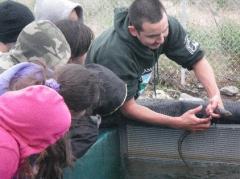
When
Thursday, January 26. 2023
:3:30 - 4:30 pm Pacific time
4th Thursday of the month from 3:30 PM to 4:30 PM PDT
Add to Calendar
Where
This is an online event.Contact
Janice Elvidge
The River Mile Network
509-449-0521
janice_elvidge@nps.gov
The River Mile Mission Statement
To foster investigation and understanding of the Columbia River Watershed and to promote watershed health
The River Mile is…
…a network of educators, students, resource managers, scientists and environmental educators in the Columbia River Watershed sharing what they know and learn about the Columbia River Watershed and sharing best practices, lessons learned, examples of participation, links to resources and collecting and sharing real world scientific data. It is a participant driven approach to learning, researching and exploring the watershed health of the Columbia River.
Students and teachers are engaged in the practices of scientists and resource managers as they become intimately familiar with their outdoor classroom by spending time in the field inventorying, monitoring, analyzing, investigating and researching site discoveries.

The River Mile
Community Virtual Gathering
Join us for different speakers and topics related to the Columbia River Watershed.
These gatherings will occur on the 4th Thursdays through June.
3:30 to 4:30 PM.
Pacific Standard Time
Pre-registration is required for securtiy reasons,
and open until 1 hour before the session.
Have an idea for a gathering? Let us know!



![]()
Next Presentaion and Discussion
Pacific Lamprey, another undervalued species that need our attention in the Pacific Northwest
Thurs. January 26, 2022
3:30 to 4:30 PM Pacific Time
Presenter:
Ralph Lampman (aka Lamp-rey-man) has been working as a Lamprey Research Biologist for the Yakama Nation Fisheries since 2012.
Pacific Lamprey, commonly called “eels” by tribal members and others, is an incredibly important species for the Columbia River tribes in terms of food, medicine, and culture. They also serve many roles in the stream ecology, benefiting many, many native species.
Ralph will demystify Pacific Lamprey secrets in relation to biology, ecology, and more, using photos, videos, songs, and more. He will also provide a synapsis for the work that has been done to restore this important species.
Ralph holds a Masters Degree in Fisheries Science from Oregon State University and a Bachelors of Science from Humboldt State University. He previously served as a Fish Biologist for the Siuslaw National Forest (U.S. Forest Service), managing timber sale consultation, adult and juvenile salmonoids monitring, in stream and riparian restoration, and education outreach. His favorite quote is, "If there is a will, there is a way."
More about the Pacific Lamprey Project
Yakama Nation is working to restore natural production of Pacific lamprey to a level that will provide robust species abundance, significant ecological contributions, and meaningful harvest within the Yakama Nations Ceded Lands and in the Usual and Accustomed areas. Come learn about this amazing species and the science that is helping it on its journey back to health.

Ralph Lampman, M.S. explains about lamprey to students.

The River Mile Network
Crayfish Study
Join the Study and Contribute Valuable Data!
The River Mile Network has teamed up with the University of Illinois and the University of Washington scientists! Data from this project will help inform researchers about the species distribution throughout the Columbia River watershed and beyond. They are asking for help locating and identifying crayfish. The project leaders are especially interested in locating invasive species around the Northwest and identifying native species below Dry Falls in Eastern Washington AND in the Okanogan River region. They believe there is an undescribed species of crayfish in those places which have not been documented (geolocated and photographed for identification). You and your students may be the first to record new species of crayfish!
Anything you can do to help researchers will be of benefit!
Check out our website! therivermile.org

